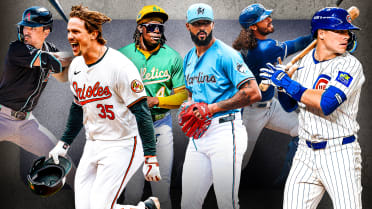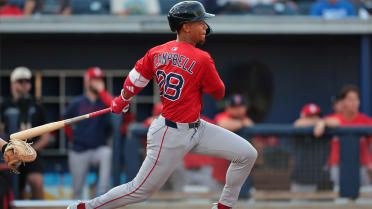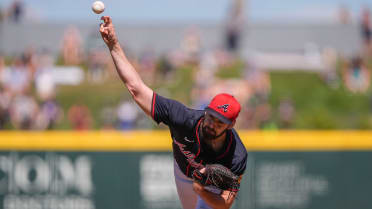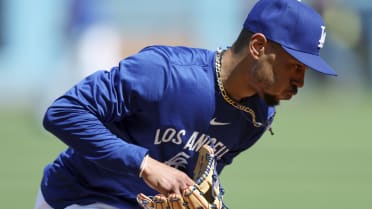DENVER -- Rockies fans who aren’t puzzled over the club not tendering a contract to outfielder David Dahl, an All-Star just two seasons ago, are mad about it. That subject accounted for many of the questions when the invite went out last night.
We’ll address that subject soon, but for now, let’s take a look at the Rockies’ catching, which also is not far from the front of fans’ minds. Tony Wolters – the starter the past two seasons – was non-tendered with Dahl and righty pitcher Chi Chi González.
Will the catching be more productive?
The Wolters move was telegraphed when the Rockies signed Elias Díaz to a one-year, $1.2 million contract, with $300,000 in available incentives -- $100,000 each for 80, 90 and 100 starts.
Going in and out of this environment limits the number of games Rockies catchers play, as I have written over the years, but Díaz’s incentives are reachable – Wolters, based mainly on his defense, appeared in 112 games in 2019.
After receiving mixed defensive reviews amid irregular action with the Pirates from 2015-19, Díaz received extended playing time in September. His hands, receiving of pitches low in the zone and blocking ability and earned favorable marks from manager Bud Black.
But the Rockies need more offensive production. According to STATS, they finished last season 27th among Major League teams in catcher OPS (.569) and 26th in on-base percentage (.264).
Díaz hit the Rockies’ only two homers from the position (Drew Butera had four, but none during his 13 games catching). During his increased September playing time, Díaz slashed .239/.255/.391. Can he do better with regular time?
Interestingly, while complimenting Díaz, general manager Jeff Bridich did not commit to him as the regular. The Rockies still have high expectations for Dom Nuñez, whose left-handed power potential led the club to release veteran Chris Iannetta late in 2019. Nuñez, however, was never called from the alternate training site in '20.
José Briceño, a non-roster signing after he saw big league time the past two seasons with the Angels, is also in the mix.
With nowhere near the experience and proven production of a contending club’s catchers, this is an area of personal opportunity, but not a team strength.
What did we just witness with Dahl? Did the Rockies have to cut him loose?
Dahl clearly is talented, at times has shown star potential. And, yes, the injuries he's dealt with throughout his career, even in the Minors, were a factor.
But with a projected arbitration figure of $2.55 million to $2.6 million, depending on the prognosticator, is that problematic enough to turn away from potential production?
Ownership ordered to trim payroll, and the baseball side declined to cut into pitching depth -- which meant they offered a contract to righty Jon Gray.
But could Dahl have been tendered before the deadline and traded later?
Dahl’s dynamic abilities say he had trade value. But the difficult economic 2020 and his injury history may have changed things.
Dahl wasn’t the only player with some accomplishment or value who was non-tendered. Presumably all were available via trade, but the industry chose to wait and hope they could be signed below their projected arbitration values.
How does non-tendering Dahl make sense baseball-wise?
For a team that struggled offensively, partly because third baseman Nolan Arenado and Dahl dealt with injuries to their lead shoulder in their batting stances, there is no way to look at the returning players and say the Rockies added by subtracting.
So, what’s next?
As many Rockies fans are aware, Bridich has declined to give a state-of-the-Rockies address beyond referring to owner Dick Monfort’s letter to fans saying COVID-19 means business will not be usual. But given the club's fourth-place finishes in the National League West each of the past two years, the payroll is problematic even in normal times.
There is $92.3 million tied up in the five highest commitments -- Arenado ($35 million), outfielder Charlie Blackmon ($21 million), shortstop Trevor Story ($18.5 million), outfielder Ian Desmond ($8 million salary, plus a $2 million buyout on a 2022 option), and right-handed starting pitcher Germán Márquez ($7.8 million). Something in the neighborhood of $16 million should go to Gray, lefty starter Kyle Freeland and righty reliever Mychal Givens when arbitration deals are done.
It leaves the Rockies stuck with either expecting less-experienced, lower-salaried players (none of whom have been regulars on a postseason team) to ignite, or having to jettison a big salary or more for a combination of experienced parts and prospects. Remember, other teams deal with the same pandemic-related revenue loss as the Rockies.
It could make for a newsy winter. Does it necessarily mean a losing 2021? Well, as I’ve said in this cyberspace before, creative teams found ways in 2020.
Senior Reporter Thomas Harding has covered the Rockies since 2000, and for MLB.com since 2002.




